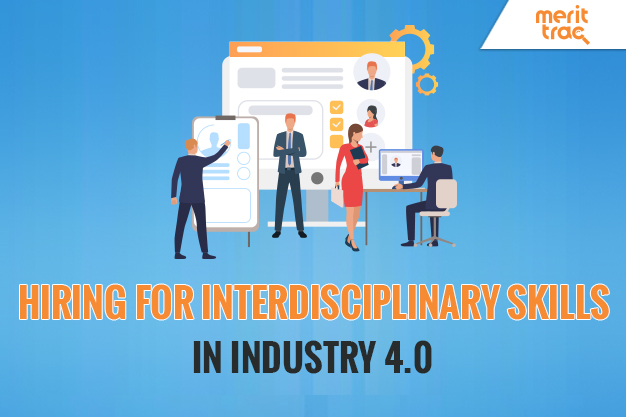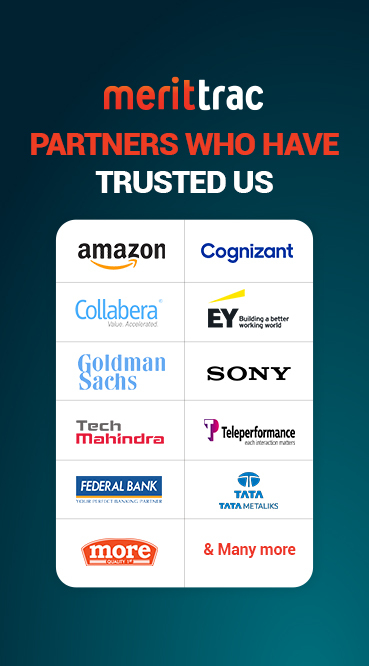
Hiring for Interdisciplinary Skills in Industry 4.0
Date: 12/07/2019 | Posted by: MeritTrac | Category: Corporate , Interdisciplinary Skills
In an increasingly uncertain economy and evolving demography, adaptability is the only way forward for organisations. With various business disciplines and functions overlapping, success will depend on the ability of firms to hire candidates who are able to understand howdiverse areas of knowledge functions are linked with each other. In addition to domain skills, candidates are required to possess soft skills such as communication, critical thinking and empathy to design customer-centric solutions and services.
However, hiring for such a wide range of skills on a large scale is a major challenge for organisations. The answer lies in leveraging a combination of scientifically designed automated assessments to test behavioural as well as domain skills of potential employees. A Wisdomjobs.com survey revealed that one of the prominent reasons why pre-assessments are gaining popularity among modern recruiters is because they are a credible tool for assessing a candidate for skills, motivations, behaviour, attitude, etc.
Here are four such interdisciplinary skills that prove to be valuable for today’s diverse roles and that can now be assessed by using tech-enabled scientific assessment tools.
- Communication Skills - Communication Assessment
Good verbal and written communication skills are a non-negotiable, if you are looking to hire high potential employees who can be trained for senior roles. The ability to understand others and convey one’s thoughts in an understandable manner – both are crucial to good performance in today’s work culture. As valuable as this skill is, it is rare to find it in most employees. The latest annual LinkedIn Emerging Jobs report says that the in the job market is communication. Employers are pay a higher premium on employees who can communicate well within their teams, deal better with customers, prepare reports and deliver a presentation at a meeting. Hence, using scientific assessments to clearly demarcate candidates with better communication skills has become a big trend among recruiters.
- Creativity - Cognitive Assessment
According to LinkedIn’s latest research, ‘creativity’ is the most in-demand soft skill. Unsurprisingly, all growth-oriented organisations, irrespective of department, need employees who apply creative thinking to today’s business problems. Firms seek workers who have the ability to approach issues with a fresh perspective and can create breakthroughs, even in the smallest of ways that add to drivers of growth such as efficiency, profits, engagement, etc.For instance, a new way to approach a non-responsive potential client is an act of creativity in a business environment. However, it is difficult to differentiate between candidates based on ‘creativity’ using traditional assessment methods, and hence organisations are turning to tech-driven assessments to test a candidate’scognitive abilities e.g. problem solving, ability to learn, etc.
- Social Media Literacy - Domain Assessment
Social media connects us all – even businesses to their customers. Platforms such as Facebook, Instagram, Twitter, Pinterest and more have emerged as the most powerful media for registering a brand’spresence in the minds of its audience. However, every brand, product and service must use each of these platforms as per their unique features and user base. Case in point: A study by the Pew Research Centre, revealed that only 21% of all U.S adults use Twitter. Companies hire digital marketers as experts in the field but also require their other business managers to have an above average level of social media literacy so they can leverage the power of social media for their specific roles. According to Monster Jobs, this is one of the top seven skills that makes an employee more marketable to employers. With more such new skills permeating into the new-age job roles, recruiters aim to leverage innovative AI-driven assessments to match the pace of innovation and disruption.
- Customer centricity – Behavioural Assessment
Today’s tech-savvy customers are more connected than ever. They are aware of the many choices available to them and the ways to compare among them. Hence, creating a new customer base and earning customer loyalty has clearly become more challenging. Therefore, competitive firms look for employees who are customer oriented in their approach and adopt modern ways to test this ability in them. Advanced predictive assessment tools are being used by recruiters to gauge levels of qualities such as empathy, patience, etc. that contribute to a candidate’s customer orientation. Leading firms such as Xerox screen their employees for compassion to assess their on-the-job performance.
Companies that understand that as their job profiles become more diverse and expansive, they also need to rethink their recruitment strategy, are more likely to find the right job matches. Highly competitive firms are doing away with traditional methods of hiring and deploying advanced hiring techniques such as analytical assessment tools, predictive assessments, AI-based online tests, etc. to hire high potential talent with a diverse skill range. Adopting a modern and scientific approach to recruitment results in more effective hiring and hence, more positive business outcomes.
Source:












 Sales Hotline: USA: +1 646 916 0939 / Others: +91 80619 14700
Sales Hotline: USA: +1 646 916 0939 / Others: +91 80619 14700


